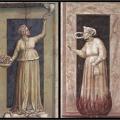334. Chance Encounters: Reviving Hellenistic Philosophy
The rediscovery of Epicurus, Lucretius, and Sextus Empiricus spreads challenging ideas about chance, atomism, and skepticism.
Themes:
• P.W.G. Gordon (trans.), Two Renaissance Book Hunters: the Letters of Poggius Bracciolini to Nicolaus de Niccolis (New York: 1991).
• D. Marsh (trans.), Leon Battista Alberti: Dinner Pieces (Binghamton, NY: 1987).
---
• A. Brown, The Return of Lucretius to Renaissance Florence (Cambridge MA: 2010).
• G.M. Cao, Scepticism and Orthodoxy: Gianfresco Pico as a Reader of Sextus Empiricus (Pisa: 2007).
• L. Floridi, Sextus Empiricus: the Transmission and Recovery of Pyrrhonism (New York: 2002).
• S. Greenblatt, The Swerve: How the World Became Modern (New York: 2012).
• J. Kraye, “The Revival of Hellenistic Philosophies,” in J. Haskins (ed.), Cambridge Companion to Renaissance Philosophy (Cambridge: 2007), 97-112.
• A. Palmer, Reading Lucretius in the Renaissance (Cambridge MA: 2014).
• S.G. Passanante, The Lucretian Renaissance: Philology and the Afterlife of Tradition (Chicago: 2011).
• C.B. Schmitt, Cicero Scepticus: a Study of the Influence of the Academica in the Renaissance (The Hague: 1972).







Comments
All episondes page not up to date
Just an observation, the all episodes page is not up to date with these renaissance episodes though the new african philosophy episodes are up to date.
In reply to All episondes page not up to date by Zardoz
not quite all episodes
Oh right, thanks for noticing this! We'll fix it.
Rediscoveries
Thank you again for yet another charming episode.
This theme of rediscovery is just mind-boggling, since it mixes the improbably contingent with the world-historically influential. Whether it's the Aristotelean corpus rediscovered by a book collector in a cellar in Asia Minor in the 1st century BC and brought to Rome by lucky old general Sulla in the midst of his war campaigns, or Lucretius rediscovered also by a book collector in a musty library in Germany 15 centuries after it was written, you can only wonder how different our intellectual heritage would have looked if these texts had been left to disintegrate as many others had. A luckily surviving text is not like a luckily surviving person, even a very important person. A text encapsulates a worldview, which can propagate through the ages and literally become part of how members of subsequent generations think.
What lesson can we learn from this about our heritage? I think it means that since it is subject to so much chance, it itself is much less a product of human agency than is usually portrayed. Fortuna and virtu are at play not only on people physically, but on entire collective mentalities.
In reply to Rediscoveries by Guy of Jerusalem
Roll of the dice
Yes, I couldn't agree more (even if, as discussed in an episode way back when, the rediscovery story of Aristotle is a bit of an exaggeration, probably). My favorite example would of be al-Kindi, whose philosophical works are mostly extant in only a single manuscript. Quite a slender thread on which our whole narrative of the beginning of philosophy in Arabic is hanging!
Jumping to the topic I just discussed in the podcast last week, though, I think that printed books change this quite a lot. It becomes far easier as of the 16th century for books to survive, and not only because they have had less time to go missing - just more copies in the first place. So if you want to argue that it is quality, not chance, that determines what survives and is read then that would be more plausible for the early modern era onward.
ROLL OF THE DICE
So now I'll definitely get myself acquainted with al-Kindi! (hmmm...where should I begin? Oh I know! There's this podcast series, you may have heard of it, it's called the history of philosophy without all those gaps, or something like that...).
Anyway, I accept your point that printing changed the world, and after that le deluge, as we know. However, I would say that Fortuna has not disappeared but merely changed shape. Some philosophical works, even of high quality, are not lost in the physical sense, but rather go unnoticed, or if noticed, forgotten quickly. There is too much circulating, and some authors and their works don't happen to be in the right place at the right time (or in the right language). I can't give you a concrete example, because that would undermine my statement that such works were unnoticed or forgotten. But let's just imagine a Russian-writing philosopher, as good as any English-writing philosopher, publishing a masterpiece of liberal political philosophy. Let's call him Lockeyevsky. I would not be surprised if there was such a man, especially if you look over a few centuries, say beginning whenever Russia had a printing press. But it doesn't matter, because unfortunately for Lockeyevsky, the center of gravity of the Russian intellectual heritage never came close to liberalism. His work went unnoticed and didn't change anything. To argue as you say, "that it is quality, not chance, that determines what survives and is read," I would have to argue that a Lockeyevsky is impossible. But I think he is possible.
In reply to ROLL OF THE DICE by Guy of Jerusalem
As chance would have it
Oh yes for sure. I actually don't think that "quality does out" all the time - to give a more concrete example of what you're talking about, it's only recently that quite a few female philosophers from after the age of print have been re-discovered, having been largely ignored since they were active. Of course that isn't mere chance, but the result of sexism, still it illustrates your point that there are lots of interesting philosophers who may have been overlooked. We'll be meeting a lot of them in due course!
By the way if you like what you hear about al-Kindi I believe there is a decent book about him out there too...
Since converting to Judaism…
Since converting to Judaism and being encouraged by my rabbi to make notes in the Torah itself, I've switched to taking extensive notes in my books - including the margins of your books. I don't think they're of much scholarly value (many of them are jokes or opinions in response to the text) but hey, not everything is made for posterity.
Add new comment